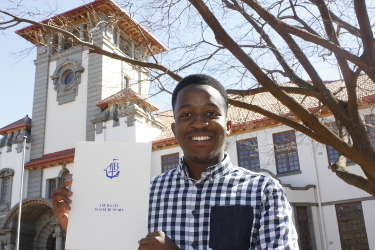Latest News Archive
Please select Category, Year, and then Month to display items
19 November 2018
|
Story Charlene Stanley
|
Photo Charlene Stanley
 Prof John Mubangizi, Dean of the Faculty of Law, encouraged delegates at the Fifth Annual International Mercantile Conference to share ideas on best international practice in their various fields.
Prof John Mubangizi, Dean of the Faculty of Law, encouraged delegates at the Fifth Annual International Mercantile Conference to share ideas on best international practice in their various fields.
“Don’t say anything online that you wouldn’t want plastered on a billboard with your face on it.”
This famous quote by international tech expert Erin Bury should be a guiding light when it comes to online habits in the workplace, according to Francois Cilliers, UFS Lecturer in Mercantile Law.
In his presentation Could Social Media be the Gateway to Employment Discrimination? he warned that employees have a responsibility not to bring their employers in disrepute through their comments on social media.
“Posts, updates, tweets, and comments are considered to be publications and can therefore never be seen as privileged information,” he explained.
Responsibility on employees and employers alike
He pointed out that employers also had a responsibility regarding the way in which they use the information about prospective employees obtained via social media.
“Nowadays, approximately 75% of companies hire through social media. In the US, recruiting companies spend hours researching candidates, making full use of what they can find on social media. It was found that 50–80% of employers frowned upon posts and pictures featuring drug and alcohol abuse, profanity, and bad grammar.”
He warned that employers needed to tread lightly, as a decision not to employ someone as a result of information on the prospective employee’s political views and sexual orientation could constitute unfair discrimination as set out in the Employment Equity Act.
“An employer who wishes to use a screening process (utilising social media) has to prove that the information and the process is objectively necessary and can be justified with reference to the inherent requirements of the job,” he explained.
“As technology and electronic systems advance, so too should the applicable labour laws.”
Cilliers’ presentation formed part of the Fifth Annual International Mercantile Law Conference recently hosted by the Faculty of Law on the Bloemfontein Campus.
Incorporating new technology in teaching and research
“This conference is an opportunity to share ideas on best practice in what is perceived as a ‘difficult’ field within Law,” said Prof John Mubangizi, Dean of the Faculty of Law, as he opened the proceedings. Topics in the discussion sessions ranged from Racism in the workplace and The underrepresentation of females in the judiciary, to Decriminalisation of cannabis: A recipe for healthy employer-employee relations?
“Conferences such as these help us to take advantage of the newest developments in technology to advance our teaching and research,” said Prof Mubangizi.
“To quote Einstein: ‘We can’t solve problems by using the same kind of thinking we used when we created them.’”
Perseverance is key for 2017 Abe Bailey recipient
2017-08-23

Gosego Moroka, recipient of the 2017 Abe Bailey Travel Bursary,
says his never-say-die attitude is what helped him win the bursary
the second time round.
Photo: Rulanzen Martin
A valuable life lesson can be learned from Gosego Moroka. The fourth-year LLB student was in the top three for the 2016 Abe Bailey Travel Bursary which was awarded to Candice Thickeson. And now in 2017 Moroka is the recipient.
“It means the world to me as it shows that perseverance is the key. I took last year’s loss as a lesson which I would use to improve as a candidate this year and I’m ecstatic that it came full circle.”
Bursary aims to broaden views
The educational tour will start on 21 November 2017. “We will be travelling to the African Union in Addis Ababa, Ethiopia, and then to London, Oxford and Cambridge universities in England, as well as Edinburgh University in Scotland,” Moroka says. The tour group will be hosted by Goodenough College in England. The bursary aims to broaden the views of young South Africans by providing outstanding students the opportunity to engage with students from other universities.
Comprehensive application process
The application process starts with a motivation letter by the applicants stating the reason for applying. They must then submit letters detailing their leadership roles in the community, school, and at university. This is followed by an interview process. “The university will recommend three persons as possible bursars,” Moroka says. The Abe Bailey Trust will then, with the recommendation of the university, make its own decision in selecting the successful candidate.
Great achievement adds to repertoire
“This achievement was extremely important to me as it is testament that greatness is something one works towards.” Moroka is a former 100m South African champion and is part of the Golden Key International Honour Society. And now he is an Abe Bailey Bursar.